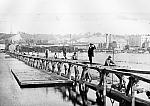
Grand Rapids Water Story, 19th Century, Part IX
Two strong points of vantage are held by the Hydraulic Company that make it, in spite of its present financial difficulties, a menacing rival to the city water works department. These two points are its perpetual charter and its spring water supply.
At this moment the company, handicapped by bankruptcy proceedings and lack of funds, is seemingly impotent. The charter, supply and plant, in the hands of a financially sound corporation, ready and able to make necessary improvements, might, however, become dangerous. This possibility is easily illustrated. If the imaginary resident had two mains before his house, one city and one hydraulic, both having the same pressure, but one supplying river water and the other spring water, he would have little difficulty in making up his mind as to which he would run into his house, especially if the rates were practically the same. He would naturally choose the spring water every time.
This illustration is, of course, based on the possible betterment of the Hydraulic Company’s service through necessary improvements. How true it would be, in the event of this betterment, is now shown on Canal street and other portions of the downtown district where the pressure of the Hydraulic Company is such as to bring it into direct competition with the city system.
Danger in Competition with City
The harm that might be done to the city works if opposition should be offered by a strong company armed with the Hydraulic Company right was realized away back in 1886, when the Hydraulic Company began to lay its present mains. T. D. Gilbert, in a forceful communication to the common council, pointed out the complications that might ensue. Acting in accordance with his warning, the council began legal proceedings to stop the Hydraulic Company from laying its mains. The company, falling back upon its charter, fought the case through the Superior and Supreme courts and won out, its charter being upheld.
The city claimed that the charter ceased to be operative through subsequent legislation, and that the company had forfeited its franchise. The first point was based on the rights given the city in 1873, when it prepared to establish water works of its own. The Supreme Court in upholding the charter of the Hydraulic Company made the following points:
What the Supreme Court Held
“The enlargement of city powers cannot, by implication, destroy or amend a private corporation charter, the amendment or repeal of which must refer to it.
Where no exclusive privileges are given to either of two corporations there can be no repugnancy.
A charter can only be forfeited by direct proceedings by the attorney general.
The lapse of thirty-two years after the expiration of the time within which a water company was to be ready to furnish water under its charter bars a prosecution for non-compliance; it not appearing that any demand for water had been unreasonably refused.
A water company, authorized by its charter to lay pipes and distribute water in a city, has a right to access to the streets or alleys for that purpose, which right must be exercised in harmony with the public convenience; and it is the duty of the city to regulate its exercise by ordinance in such a way as to prevent injury to other interests, while not interfering with the reasonable exercise of such right.
Where a city succeeds by its charter to the rights and obligations of a village, whose territory is included in the new corporation, this in law continues the body politic as the same legal body.
It has never been supposed that a city or any other public corporation changed its rights or identity by gaining or losing territory.”
Has the Company Forfeited Its Rights?
This case settled the rights of the Hydraulic Company under its charter up to July 7, 1887. Whether the company has forfeited its charter by any action since 1887 would have to be determined by further proceedings. The claim has been made that grounds of forfeiture have been established in the past few years. The charge has been made, though not proven, that the company has forfeited by making an alleged connection between the river and its pumping well, thus disobeying the charter provision which says: “Said supply of water shall be obtained from the springs of water in and about said village; from Cold brook; from the lake or lakes from which it has its source, or either of them, and from no other source.”
It has also been claimed that the company has forfeited its rights by supplying water for uses other than those provided in the following paragraph: “The company shall not use the water or improvements made or obtained under this act of incorporation for the purpose of propelling machinery, or for any other purpose than that of supplying the city of Grand Rapids with a pure, wholesome supply of water for household purposes and domestic uses, and to supply reservoirs for the extinguishing of fires.”
Legislature Might Revoke Charter
Whether these claims will stand in court is to be proven. The legislature reserved the right to repeal the charter, but forecasts as to what a Michigan legislature will do are hazardous. There is a legal question, too, as to the right of the legislature, by its simple act, to take away vested rights.
There is one other way in which the charter can be removed from the field. It is by the purchase of the Hydraulic Company’s plant by the city. This has been proposed several times, but no deal has advanced farther than the preliminary negotiation.
At present the plant of the company would have value to the city for just one purpose – the furnishing of a pure supply of water for domestic use, as an auxiliary to the supply obtained from the river for general purposes.
City Could Use Hydraulic Plant
A purchase for this purpose would involve the adoption of a duplicate system of water supply. The present city supply would be used to furnish water for fire protection, business purposes, street sprinkling and the like. The Hydraulic Company supply would be used to furnish pure drinking water for domestic purposes. The river will be able to supply all the water for general purposes that Grand Rapids will probably ever need. The Hydraulic company property, together with ground water that is available in its vicinity, will be able to furnish enough spring water for domestic purposes for many years to come.
In time the present Hydraulic company supply may become contaminated through the growth of the city to the north, just as the city supply became contaminated through the increase of population in the valleys of Coldbrook and Carrier creeks.
This duplicate system was suggested by Engineer J. M. Howell fifteen years ago. It was also considered by the special committee that examined the water situation in the late ‘80s.
Cost of the Plant
If the city should buy the Hydraulic Company plant the price would doubtless range somewhere between $75,000 and $115,000, covering only the actual value at the present time. It is very doubtful if citizens would consent to pay a single cent for the franchise of the company.
In the event of the adoption of the duplicate system, the city would have to build new ground water galleries at the Hydraulic Company plant, lay a new 24-inch main to the city and duplicate its present mains to a large extent with small pipe.
It is likely that there will be developments in the Hydraulic situation at an early date. The bondholders are becoming active, and so is the city administration. They are working to counter purposes just a present, but their efforts, one way or the other, are likely to have results soon.
Grand Rapids Press, October 22, 1904
This is the final article in the Grand Rapids Press 1904 series about the Grand Rapids Hydraulic Company.
Transcribed by Rebecca Smith-Hoffman
Article Posted July 6, 2014

 facebook
facebook











